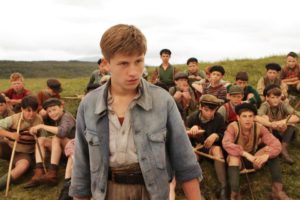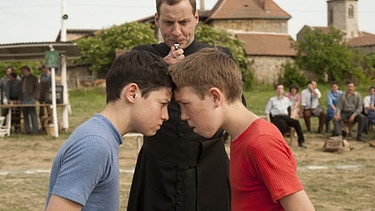The genre of the family movie often has a stigma attached to it, that stigma being they are often a basic narrative with two-dimensional characters that I don’t care about, finishing with a happy ending and a big red ribbon wrapped around it. It’s the standard, learn it, love it, live by it. “War of the Buttons,” on the other hand, falls into a sort of niche that I love: A family movie that still teaches you a lesson but is genuinely entertaining.
The movie isn’t afraid to address issues such as domestic abuse, poverty, class gaps and the problems associated with it, and even political ideas. All of this is done convincingly through the eyes of children. It doesn’t patronise children, nor does it demonise them. It presents them in a sympathetic light, almost like they were any other character at any age. This is what makes this film shine above every other family movie in an over saturated market.
The film follows to groups of school children ranging in age from about 9-14. One group is from the village of Ballydowse, and serves as the centre of the film, led by Fergus. The second group is from the village of Carrickdowse, who act as rivals to the Ballydowse in the “war.” This group is led by Jerome, otherwise known as ‘Geronimo.’ The two factions have an intense hatred of each other but the two leaders seem to show a mutual respect for one another. The incidents in which the two groups come into conflict slowly raises throughout the movie until it gets to the point where the adults are taking notice and actual danger is involved.
As the title would imply, there is war. However, since every main character is no older than 14, don’t expect “Saving Private Ryan.” That being said, the fight scenes are actually well choreographed and come off as remarkably epic. Even the scene where the Ballydowse group is naked and chasing the Carrickdowse group is really entertaining. The comedy of the film stands out. Often with child actors doing jokes it can come of as awkwardly timed or just flat or not funny. In “War of the Buttons,” I laughed at the vast majority of jokes because they were funny. I find the Ballydowse boys bribing a small child with a lollipop and telling him to say tosspot to a priest to see if it’s a bad word or not to be incredibly funny. That is where the film shows itself to be ahead of the curve. It’s not afraid to take on risqué jokes, and for the most part it comes off great. Very few movies would have the sheer nerve to put a drunk child on screen and have him walk down the street while shouting “The Rocky Road To Dublin.”

The film also has a serious tone to it, mainly seen through the character of Fergus. Fergus comes from a lower class family with an abusive father figure. This makes for an incredible character. The way he interacts with other characters and how is seen as the leader is what really gets my attention. It follows the idea that the most damaged people are often the wisest, and it is no different here. Fergus and Geronimo seem to be the only sane characters, including the adults. Not much is seen of Geronimo’s life but he seems to be the Carrick equivalent of Fergus. Fergus also leads the debate in how they should raise funds for the war, which brings up a conflict between the middle class and the lower class children. This, whether it was intentional or not, brings up a subtle allegory of the positives and negatives of a Communist system. The lower class children want to share the wealth so that they can fight the war more efficiently, but the middle class children believe that they are being singled out because they’re better off. To see this in the same film as a group of 30 or so naked children running after their enemies is a surreal experience to say the least.
I maintain that this is a great film but it still has its problems, the main one being that even though I have praised the child actors for their comic ability, when the film delves into more dramatic moments I feel the children can’t quite pull it off. They end up having no actual emotion and quickly lose my connection with the character. The only other complaint is that even for an Irish film set in in the ‘30s or ‘40s, the stereotypes get a little annoying. Everyone is a farmer or a housewife and they all know each other. It was made in 1994; the filmmakers could have been a little subtler.
Overall, “War Of The Buttons” has a lot of heart and is very funny. If you have kids and are okay with a little bit of language and violence, let them watch it. If you’re on your own and stumble across it, then watch it for a laugh.
– by Paul O’Connor


